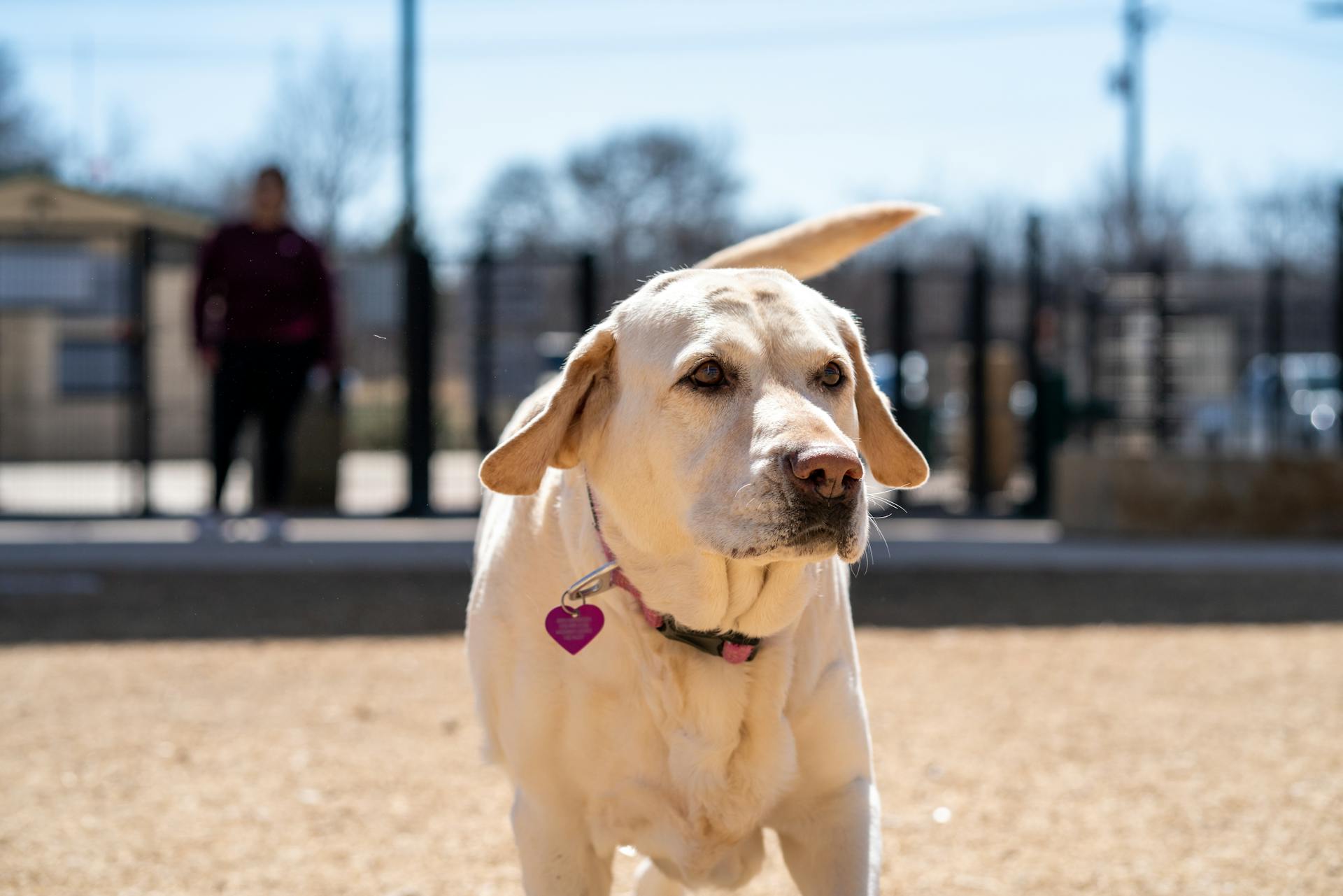
Service animals play a vital role in assisting individuals with disabilities, and it's essential to understand the rights and responsibilities that come with having one.
Individuals with disabilities have the right to have their service animals with them in all public places, including restaurants, stores, and hotels.
This right is protected under the Americans with Disabilities Act (ADA), which requires businesses to allow service animals in their facilities.
Service animals must be trained to perform specific tasks to assist their owners, such as opening doors or picking up items.
In order to qualify as a service animal, a dog must be trained to perform a specific task or set of tasks that assist its owner.
Service animals are not pets, and they are not required to be certified or registered.
A fresh viewpoint: Tasks for Psychiatric Service Dogs
Service Animal Laws
Service animals are protected under both federal and state laws. Federal law defines a service animal as an animal that is trained to perform tasks for an individual with a disability.
You can find more information on federal service animal laws on the ADA.gov website. This includes a summary publication called Revised ADA Requirements for Service Animals, as well as the complete 2010 Title II and Title III regulations.
In Florida, service animals are also protected under state law. Florida Statute Chapter 413.08 defines a service animal as an animal that is trained to perform tasks for an individual with a disability. The tasks may include guiding a person who is visually impaired or blind, alerting a person who is deaf or hard of hearing, and pulling a wheelchair.
Under Florida law, service animals are not considered pets. A service animal is defined as a dog or miniature horse that is trained to perform specific tasks for an individual with a disability.
State and local governments are also subject to service animal laws. Title II of the ADA requires state and local governments to provide equal access to services, programs, and activities for individuals with disabilities and their service animals. This includes courthouses and other governmental buildings.
Some examples of how state and local governments can support service animals include requiring service dogs to be licensed and vaccinated, if all dogs are required to be licensed and vaccinated, and offering voluntary service dog registration programs.
Recommended read: Tasks That Service Dogs Perform
Here are some key differences between federal and state service animal laws:
Keep in mind that service animals-in-training are specifically protected under Florida law. Any trainer of a service animal has the same rights and privileges as an individual with a service animal, and is held to the same liability for damage as an individual with a service animal.
Rights and Responsibilities
Service animals have specific rights and responsibilities that are protected by law. These laws require state and local governments, public accommodations, and commercial facilities to allow service animals to accompany individuals with disabilities in all areas where members of the public are allowed to go.
Service animal owners are allowed to ask about the dog's behavior and training, but only in specific situations. They can ask: "Is the dog a service animal required because of a disability?" and "What work or task has the dog been trained to perform?"
Service animal owners are responsible for their animal's behavior, and must take action if the animal is out of control. If your animal is out of control and you don't take action, you can be asked to remove your animal from the premises.
Readers also liked: Is a Public Access Test Required for Service Dogs
Disability Rights and Responsibilities
Under the ADA, an individual with a disability is a person who has a physical or mental impairment that substantially limits one or more major life activities of such an individual.
Service animals are trained to perform specific tasks to assist people with disabilities, such as guiding people who are blind or have low vision, or alerting people who are deaf or hard of hearing.
Examples of service animal tasks include guiding, alerting, providing non-violent protection or rescue work, pulling a wheelchair, assisting during a seizure, and retrieving items.
A service animal's behavior must be under the control of its owner, and it should not pose a direct threat to the health or safety of others.
If your animal is out of control and you don't take effective action to control it, you can be asked to remove it from the premises.
You are responsible for the care or supervision of your service animal, including providing food, removing animal feces, and identifying appropriate locations for animal use.
Here are some examples of service animal tasks:
- Guiding people who are blind or have low vision
- Alerting people who are deaf or hard of hearing
- Providing non-violent protection or rescue work
- Pulling a wheelchair
- Assisting an individual during a seizure
- Alerting individuals to the presence of allergens
- Retrieving items
- Providing physical support and assistance with balance and stability to individuals with mobility disabilities
- Helping persons with psychiatric or neurological disabilities by preventing or interrupting impulsive or destructive behaviors
- Reminding a person with mental illness to take prescribed medications
- Calming a person with Post Traumatic Stress Disorder (PTSD) during an anxiety attack.
Note: Crime deterrence, safety, or the provision of comfort or emotional support do not constitute "work or tasks" under the ADA.
Dogs in Training
Service dogs in training are protected by law, just like trained service dogs. Florida State Statute 413.08 (8) ensures they're allowed in all public spaces, including the University of Florida.
A service dog in training must be identified with a vest or other marker that clearly indicates it's a service dog in training, unlike a trained service dog.
To ensure the dog's safety and the safety of others, it must behave and remain under the control of the handler at all times, whether on a leash or harness.
Here are the key requirements for a service dog in training:
- Be identified with a vest or other marker that clearly indicates it's a service dog in training
- Behave and remain under the control of the handler at all times, whether on a leash or harness
Registration
Registration can be a straightforward process, especially for assistance dogs. In Ohio, if you can provide proof that your dog is an assistance dog, you're exempt from registration fees.
To qualify, your dog must meet the definition in Ohio Revised Code § 955.011. This means you'll need to provide a certificate or other documentation to support your claim.
Once registered, you'll receive certificates and tags that are stamped "Ohio Assistance Dog - Permanent Registration" and contain a registration number. This is a one-time process, and you won't need to renew your registration annually.
It's essential to note that registration has no bearing on your rights under the ADA.
Public Access
Public access is a fundamental right for individuals with service animals. Businesses that are open to the public, such as restaurants, theaters, and hospitals, cannot exclude service animals from entering their establishments.
Examples of public accommodations include grocery stores, department stores/malls, health clubs, parks, zoos, and all public transportation systems.
Service animals are allowed to enter anywhere an individual with a disability is allowed to enter, including public transportation systems like airlines, car rentals, trains/metro systems, buses/shuttles, and taxi services.
See what others are reading: Are Service Dogs Allowed in National Parks
The University of Florida allows the use of trained service animals by individuals with disabilities in all public areas.
Service animals are defined as dogs trained to do work or perform tasks for a person with a disability, such as guiding people who are blind or alerting people who are deaf.
Some examples of work or tasks that service animals can perform include:
- Guiding people who are blind
- Alerting people who are deaf
- Pulling a wheelchair or equipment for someone with a mobility disability
- Alerting or protecting a person who is having a seizure
- Reminding a person with mental illness to take prescribed medicine
- Calming a person with PTSD
- Performing other duties
In addition to dogs, miniature horses that have been individually trained to do work or perform tasks for people with disabilities are also covered under the ADA regulations.
Inquiries and Identification
You can only ask two specific questions to determine if an animal is a service animal. These questions are: "Is the service animal required because of a disability?" and "What work or task is the animal trained to perform?"
Service animals must be under the control of their handler at all times, and they should be harnessed, leashed, or tethered unless it interferes with the animal's work or the handler's disability prevents them from using these devices.
There are restrictions to inquiries. You should not ask the person about their disability or medical condition, nor should you ask for medical documentation. The dog does not require any training documentation.
A unique perspective: Medical Dog Training
Inquiring About

Inquiring about service animals requires a delicate approach to ensure you're respecting the individual's rights while also understanding their needs. Authorized UF personnel may ask only two questions to determine if an animal is a service animal.
These questions are: "Is the service animal required because of a disability?" and "What work or task is the animal trained to perform?" These inquiries are specifically allowed under the ADA.
You should never ask a person about their disability or medical condition, as this is intrusive and violates their right to privacy. Don't ask for medical documentation, as it's not required for service animals. The focus should be on the animal's role, not the person's medical history.
If you're unsure about what questions to ask, remember that only two inquiries are permitted. Always prioritize respecting the individual's boundaries and focusing on the animal's purpose.
For another approach, see: Blind Person and Dog
Voluntary Identification
Voluntary identification is a crucial aspect of inquiries and identification. It's the process of providing information about oneself, usually in a formal setting.
In some cases, voluntary identification can be as simple as providing a name and contact information, as seen in the case of reporting a lost pet. You can also choose to provide additional details, like a description of the pet or the location where it was last seen.
Voluntary identification can also involve providing identification documents, such as a driver's license or passport, to verify one's identity. This is often required in situations like renting an apartment or opening a bank account.
In the context of online platforms, voluntary identification may involve creating a user account and providing basic information about yourself, such as your name and email address. This information can be used to verify your identity and prevent potential misuse.
Providing voluntary identification can have its benefits, such as gaining access to exclusive services or events, or simply feeling more secure in your online interactions.
For more insights, see: Information about Service Dogs
Frequently Asked Questions
Which animals are recognized as service animals?
Service animals are primarily dogs, but miniature horses may also be recognized as service animals if they're individually trained to assist individuals with disabilities.
What makes my dog a service animal?
Your dog is considered a service animal if it's trained to perform a specific task that helps alleviate a person's disability, such as sensing an anxiety attack and taking action to prevent or reduce its impact. A service animal is not just any assistance animal, but one that's specifically trained to assist with a disability.
What are the most common service animals?
Dogs are the most common service animals, often trained to assist individuals with disabilities. They are highly versatile and widely used due to their intelligence and trainability
Featured Images: pexels.com


